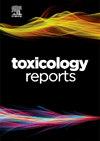Assessment of the main signaling pathways involved in the combined therapy of hepatocellular carcinoma using Sorafenib and NK cells in xenograft mice model
Q1 Environmental Science
引用次数: 0
Abstract
Hepatocellular carcinoma (HCC) is the third leading cause of cancer-related deaths worldwide. Sorafenib is the only FDA approved drug for HCC patients, affecting patient survival by just a few months with significant toxicities in approximately half of HCC patients and the poor prognosis of these patients. Thus, the combination therapy with Sorafenib and Natural killer (NK) cells has been suggested, due to NK cells' distinct effectiveness against HCC. This research examined the main signaling pathways in HCC progression affected by Sorafenib or NK cells in combination or individual treatment. The xenograft model of HCC was created by implanting human HepG2 cells subcutaneously into the flank of 12 nude mice and then divided into four groups: Control, Sorafenib, NK cells, and Sorafenib plus NK cells. Four weeks post tumor implantation, the mice were euthanized, and the levels of liver and kidney enzymes were analysed for safety purposes. Quantitative real-time PCR analysis was used to measure the expression of key effector genes related to Sorafenib and NK cell functions with focused on the signaling pathways involved in the development of HCC. The levels of Aspartate aminotransferase (AST), Alanine transaminase (ALT), Blood urea nitrogen (BUN), and creatinine (Cr) in all groups remained in normal ranges. The expression levels of certain proliferative, anti-apoptotic factors were reduced in groups treated with either Sorafenib or NK cells only, but in combinational treated group showed no significant differences compared to control group. Also, the NK cell effector function related genes were upregulated in NK cell treated group, but inhibited in co administration of both NK cell and Sorafenib. Therefore, combining Sorafenib and NK cells at the prescribed dosage led to a decrease in the anti-cancer efficiency of both and may not be a successful option for HCC treatment.
异种移植小鼠模型索拉非尼和NK细胞联合治疗肝癌的主要信号通路的评估
肝细胞癌(HCC)是全球癌症相关死亡的第三大原因。索拉非尼是FDA批准的唯一用于HCC患者的药物,仅影响患者生存几个月,约一半的HCC患者存在显著毒性,这些患者预后不良。因此,由于NK细胞对HCC具有明显的疗效,因此建议将索拉非尼和自然杀伤(NK)细胞联合治疗。本研究考察了索拉非尼或NK细胞联合或单独治疗影响HCC进展的主要信号通路。将人HepG2细胞皮下植入12只裸鼠腹部,建立肝癌异种移植模型,并将其分为对照组、索拉非尼组、NK细胞组和索拉非尼+ NK细胞组。肿瘤植入四周后,对小鼠实施安乐死,并对肝脏和肾脏酶水平进行安全分析。采用实时荧光定量PCR方法检测索拉非尼及NK细胞功能相关关键效应基因的表达,重点研究HCC发生发展的信号通路。各组血中谷草转氨酶(AST)、丙氨酸转氨酶(ALT)、尿素氮(BUN)、肌酐(Cr)水平均在正常范围内。单用索拉非尼或NK细胞治疗组细胞中某些增殖、抗凋亡因子的表达水平均降低,但联合治疗组与对照组相比差异无统计学意义。NK细胞处理组NK细胞效应功能相关基因表达上调,而NK细胞和索拉非尼联合给药组NK细胞效应功能相关基因表达受到抑制。因此,在规定剂量下联合索拉非尼和NK细胞导致两者的抗癌效率下降,可能不是HCC治疗的成功选择。
本文章由计算机程序翻译,如有差异,请以英文原文为准。
求助全文
约1分钟内获得全文
求助全文
来源期刊

Toxicology Reports
Environmental Science-Health, Toxicology and Mutagenesis
CiteScore
7.60
自引率
0.00%
发文量
228
审稿时长
11 weeks
 求助内容:
求助内容: 应助结果提醒方式:
应助结果提醒方式:


